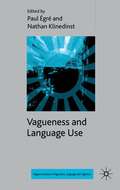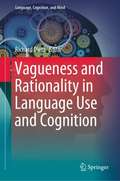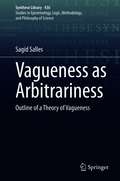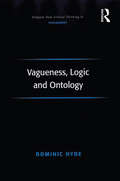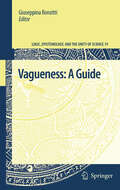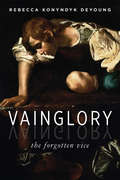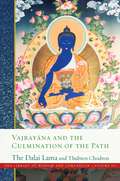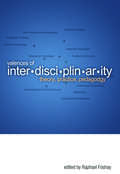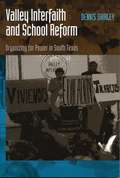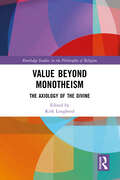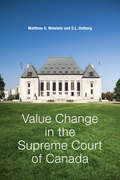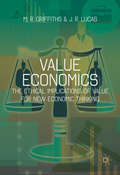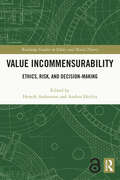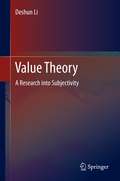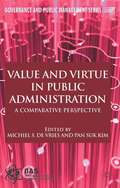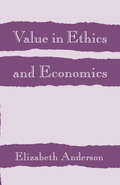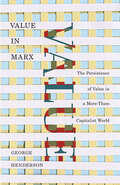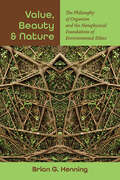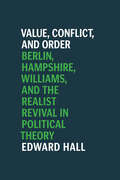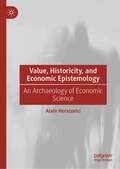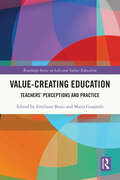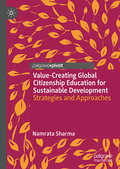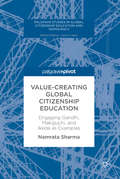- Table View
- List View
Vagueness and Language Use
by Paul Égré Nathan KlinedinstThis volume brings together twelve papers by linguists and philosophers contributing novel empirical and formal considerations to theorizing about vagueness. Three main issues are addressed: gradable expressions and comparison, the semantics of degree adverbs and intensifiers (such as 'clearly'), and ways of evading the sorites paradox.
Vagueness and Rationality in Language Use and Cognition (Language, Cognition, and Mind #5)
by Richard DietzThis volume presents new conceptual and experimental studies which investigate the connection between vagueness and rationality from various systematic directions, such as philosophy, linguistics, cognitive psychology, computing science, and economics. Vagueness in language use and cognition has traditionally been interpreted in epistemic or semantic terms. The standard view of vagueness specifically suggests that considerations of agency or rationality, broadly conceived, can be left out of the equation. Most recently, new literature on vagueness has been released which suggests that the standard view is inadequate and that considerations of rationality should factor into more comprehensive models of vagueness. The methodological approaches presented here are diverse, ranging from philosophical interpretations of rational credence for vagueness to adaptations of choice theory (dynamic choice theory, revealed preference models, social choice theory), probabilistic models of pragmatic reasoning (Bayesian pragmatics), evolutionary game theory, and conceptual space models of categorisation.
Vagueness as Arbitrariness: Outline of a Theory of Vagueness (Synthese Library #436)
by Sagid SallesThis book proposes a new solution to the problem of vagueness. There are several different ways of addressing this problem and no clear agreement on which one is correct. The author proposes that it should be understood as the problem of explaining vague predicates in a way that systematizes six intuitions about the phenomenon and satisfies three criteria of adequacy for an ideal theory of vagueness. The third criterion, which is called the “criterion of precisification”, is the most controversial one. It is based on the intuition that a predicate is vague only if it is imprecise. The author considers some different definitions of linguistic imprecision, proposing that a predicate is imprecise if and only if there is no sharp boundary between objects to which its application yields some particular truth-value and objects to which its application does not yield that truth-value. The volume critically reviews the current theories of vagueness and proposes a new one, the Theory of Vagueness as Arbitrariness, which defines a vague predicate as an arbitrary predicate that must be precisified in order to contribute to a sentence that has truth-conditions. The main advantages of this theory over the current alternatives are that it satisfies all three criteria and systematizes the relevant intuitions.
Vagueness, Logic and Ontology (Ashgate New Critical Thinking In Philosophy Ser.)
by Dominic HydeThe topic of vagueness re-emerged in the twentieth century from relative obscurity. It deals with the phenomenon in natural language that manifests itself in apparent semantic indeterminacy - the indeterminacy, for example, that arises when asked to draw the line between the tall and non-tall, or the drunk and the sober. An associated paradox emphasises the challenging nature of the phenomenon, presenting one of the most resilient paradoxes of logic. The apparent threat posed for orthodox theories of the semantics and logic of natural language has become the focus of intense philosophical scrutiny amongst philosophers and non-philosophers alike. Vagueness, Logic and Ontology explores various responses to the philosophical problems generated by vagueness and its associated paradox - the sorites paradox. Hyde argues that the theoretical space in which vagueness is sometimes ontologically grounded and modelled by a truth-functional logic affords a coherent response to the problems posed by vagueness. Showing how the concept of vagueness can be applied to the world, Hyde's ontological account proposes a substantial revision of orthodox semantics, metaphysics and logic. This book will be of particular interest to readers in philosophy, linguistics, cognitive science and geographic information systems.
Vagueness: A Guide
by Giuseppina RonzittiThis volume explores how vagueness matters as a specific problem in the context of theories that are primarily about something else. After an introductory chapter on the Sorites paradox, which exposes the various forms the paradox can take and some of the responses that have been pursued, the book proceeds with a chapter on vagueness and metaphysics, which covers important questions concerning vagueness that arise in connection with the deployment of certain key metaphysical notions. Subsequent chapters address the following: vagueness and logic, which discusses the sort of model theory that is suggested by the main, rival accounts of vagueness; vagueness and meaning, which focuses on contextualist, epistemicist, and indeterminist theories; vagueness and observationality; vagueness within linguistics, which focuses on approaches that take comparison classes into account; and the idea that vagueness in law is typically extravagant and that extravagant vagueness is a necessary feature of legal systems.
Vainglory: The Forgotten Vice
by Rebecca Konyndyk DeYoungJulia Roberts on the red carpet at the Oscars. Lady Gaga singing “Applause” to worshipful fans at one of her sold-out concerts. And you and me in our Sunday best in the front row at church. What do we have in common?Chances are, says Rebecca Konyndyk DeYoung, that we all suffer from vainglory -- a keen desire for attention and approval. Although contemporary culture has largely forgotten about vainglory, it was on the original list of seven capital vices and is perhaps more dangerous than ever today.In Vainglory: The Forgotten Vice DeYoung tells the story of this vice, moving from its ancient origins to its modern expressions. She defines vainglory, gives examples from popular culture, explores motivational sources, and discusses other vices associated with it such as hypocrisy and boasting. After exposing the many ways in which vainglory can rear its ugly head, she explores personal spiritual practices that can help us resist it and community practices that can help us handle glory well.
Vajrayana and the Culmination of the Path (The Library of Wisdom and Compassion #10)
by Dalai Lama Venerable Thubten ChodronThe final volume of the Library of Wisdom and Compassion by His Holiness the Dalai Lama takes us to the uncommon practices and realizations of Vajrayana to the full awakening of a buddha.His Holiness the Dalai Lama skillfully illuminates the unique qualities of Vajrayana, as practiced in Tibet, and the method to eradicate the subtlest obscurations preventing the full awakening of a buddha. Speaking to newcomers and advanced students alike, he explains the similarities and differences of the Sutra and Tantra paths. Having gathered many of the doubts and difficult points concerning the tantric path, he clarifies the purpose of receiving proper empowerment by qualified gurus and the ethical restraints and commitments required to enter the path of secret mantra. The paths and stages of the four tantric classes are explained, as are the generation-stage and completion-stage practices of Highest Yoga Tantra. You are introduced to the practices of clear appearance and divine identity common to all tantric sadhanas, as well as the distinctive practices of illusory body and actual clear light that overcome the subtlest defilements on the mind and eliminate all obscurations quickly. The understanding of emptiness in Sutra and Tantra is the same, but the consciousness perceiving emptiness differs. In Highest Yoga Tantra that consciousness is great bliss, which arises from knowing the methods to manipulate the channels, winds, and drops of the subtle body. In short, in Vajrayana and the Culmination of the Path the Dalai Lama sets out the path that leads to blissful awakening and enables us to be of great benefit to all sentient beings.
Valences of Interdisciplinarity: Theory, Practice, Pedagogy
by Raphael FoshayThe modern university can trace its roots to Kant's call for enlightened self-determination, with education aiming to produce an informed and responsible body of citizens. As the university evolved, specialized areas of investigation emerged, enabling ever more precise research and increasingly nuanced arguments. In recent decades, however, challenges to the hegemony of disciplines have arisen, partly in response to a perceived need for the university to focus greater energy on its public vocation—teaching and the dissemination of knowledge. Valences of Interdisciplinarity presents essays by an international array of scholars committed to enhancing our understanding of the theoretical underpinnings and the practical realities of interdisciplinary teaching and research. What is, and what should be, motivating our reflections on (and practice of) approaches that transcend the conventional boundaries of discipline? And in adopting such transdisciplinary approaches, how do we safeguard critical methods and academic rigour? Reflecting on the obstacles they have encountered both as thinkers and as educators, the authors map out innovative new directions for the interdisciplinary project. Together, the essays promise to set the standards of the debate about interdisciplinarity for years to come.
Valley Interfaith and School Reform: Organizing for Power in South Texas
by Dennis ShirleyCan public schools still educate America's children, particularly in poor and working class communities? Many advocates of school reform have called for dismantling public education in favor of market-based models of reform such as privatization and vouchers. <P>By contrast, this pathfinding book explores how community organizing and activism in support of public schools in one of America's most economically disadvantaged regions, the Rio Grande Valley of South Texas, has engendered impressive academic results. <P><P> Dennis Shirley focuses the book around case studies of three schools that have benefited from the reform efforts of a community group called Valley Interfaith, which works to develop community leadership and boost academic achievement. He follows the remarkable efforts of teachers, parents, school administrators, clergy, and community activists to take charge of their schools and their communities and describes the effects of these efforts on students' school performance and testing results.
Value And Virtue In A Godless Universe
by Erik J. WielenbergSuppose there is no God. This might imply that human life is meaningless, that there are no moral obligations and hence people can do whatever they want, and that the notions of virtue and vice and good and evil have no place. Erik J. Wielenberg believes this view to be mistaken and in this book he explains why. He argues that even if God does not exist, human life can have meaning, we do have moral obligations, and virtue is possible. Naturally, the author sees virtue in a Godless universe as different from virtue in a Christian universe, and he develops naturalistic accounts of humility, charity, and hope. The moral landscape in a Godless universe is different from the moral landscape in a Christian universe, but it does indeed exist. Value and Virtue in a Godless Universe is a tour of some of the central landmarks of this under-explored territory.
Value Beyond Monotheism: The Axiology of the Divine (Routledge Studies in the Philosophy of Religion)
by Kirk LougheedThis book expands the current axiology of theism literature by assessing the axiological status of alternative conceptions of God and the divine. To date, most of the literature on the axiology of theism focuses almost exclusively on the axiological status of theism and atheism. Specifically, it focuses almost entirely on monotheism, typically Judeo-Christian conceptions of God, and atheism, usually construed as ontological naturalism. This volume features essays from prominent philosophers of religion, ethicists, and metaphysicians addressing the value impact of alternative views such as ultimism, polytheism, pantheism, panentheism, and idealism. Additionally, it reflects a wider trend in analytic philosophy of religion to broaden its scope beyond the Judeo-Christian tradition. Value Beyond Monotheism will be of interest to scholars and advanced students working in the philosophy of religion, ethics, and metaphysics.
Value Change in the Supreme Court of Canada
by Cynthia Ostberg Matthew WetsteinValue Change in the Supreme Court of Canada is a groundbreaking analysis of the degree to which Supreme Court decisions reflect the changing values of society over the past four decades. Focusing on three key areas of law: environmental disputes, free speech, and discrimination cases, Wetstein and Ostberg provide a revealing analysis of the language used by Supreme Court justices in landmark rulings in order to document the way that value changes are transmitted into the legal and political landscape. Bolstered by a comprehensive and nuanced blend of research methods, Value Change in the Supreme Court of Canada offers a sweeping analysis of pre- and post-Charter influences, one that will be of significant interest to political scientists, lawyers, journalists, and anyone interested in the increasingly powerful role of the Supreme Court.
Value Economics: The Ethical Implications of Value for New Economic Thinking
by M. R. Griffiths J. R. LucasThe last financial crisis revealed a gap between business practice and ethics. In Value Economics, Griffiths and Lucas examine some of the reasons for this ethical gap and discuss the resulting loss of confidence in the financial system. One of the reasons has been hazy or inadequate thinking about how we value economic enterprises. With the close link between the creation of value and business ethics in mind, this book proposes that economic value should become the basic metric for evaluating performance in the creation of value, and for establishing fair and reasonable standards for executive compensation. Value Economics considers a number of rational philosophical principles for business management, on which practical codes of business ethics can be based. As the creation of value has moral implications for economic justice, the book reaffirms the argument for economics as a moral science, and seeks, within the context of proposed changes in the regulation and control of financial services, to answer the following question: will things really change after the last financial crisis?
Value Incommensurability: Ethics, Risk, and Decision-Making (Routledge Studies in Ethics and Moral Theory)
by Anders HerlitzIncommensurability is the impossibility to determine how two options relate to each other in terms of conventional comparative relations. This book features new research on incommensurability from philosophers who have shaped the field into what it is today, including John Broome, Ruth Chang and Wlodek Rabinowicz. The book covers four aspects relating to incommensurability. In the first part, the contributors synthesize research on the competing views of how to best explain incommensurability. Part II illustrates how incommensurability can help us deal with seemingly insurmountable problems in ethical theory and population ethics. The contributors address the Repugnant Conclusion, the Mere Addition Paradox and so-called Spectrum Arguments. The chapters in Part III outline and summarize problems caused by incommensurability for decision theory. Finally, Part IV tackles topics related to risk, uncertainty and incommensurability. Value Incommensurability: Ethics, Risk, and Decision-Making will be of interest to researchers and advanced students working in ethical theory, decision theory, action theory, and philosophy of economics.
Value Theory: A Research into Subjectivity
by Deshun LiHumankind's progress has always been driven by two momentums: the pursuit of truth and the creation of value. But our understanding of value, and our ability to reflect on its complexity, has long lagged behind our constant search for truth. This has, in turn limited our grasp of the essence of truth. This book takes philosophical contemplations on value to a new level, while also explicating some contemporary Chinese styles of philosophical thought. Over the past 25 years, this book has been having an increasing impact on Chinese readers and researchers, and it also provides a good platform for international dialogue on several key issues of philosophical studies.
Value and Understanding: Essays for Peter Winch
by Raimond GaitaThe voices in this volume, those of philosophers from Britain, Europe, America and Australia, speak in different tones of sumpathy and criticism of Winch and his conception of human conditioning.
Value and Virtue in Public Administration: A Comparative Perspective
by Michiel S. De Vries Pan Suk KimA multidisciplinary analysis of the role of values and virtue in public administration, this book calls for a rediscovery of virtue. It explores ways of enabling the public sector to balance the values that are presently dominant with classic values such as accountability, representation, equality, neutrality, transparency and the public interest.
Value in Ethics and Economics
by Elizabeth AndersonElizabeth Anderson offers a new theory of value and rationality that rejects cost-benefit analysis in our social lives and in our ethical theories. This account of the plurality of values thus offers a new approach, beyond welfare economics and traditional theories of justice, for assessing the ethical limitations of the market. In this light, Anderson discusses several contemporary controversies involving the proper scope of the market, including commercial surrogate motherhood, privatization of public services, and the application of cost-benefit analysis to issues of environmental protection.Table of Contents: Preface 1. A Pluralist Theory of Value A Rational Attitude Theory of Value Ideals and Self-Assessment How Goods Differ in Kind (I): Different Modes of Valuation How Goods Differ in Kind (II): Social Relations of Realization 2. An Expressive Theory of Rational Action Value and Rational Action The Framing of Decisions The Extrinsic Value of States of Affairs Consequentialism Practical Reason and the Unity of the Self 3. Pluralism and Incommensurable Goods The Advantages of Consequentialism A Pragmatic Theory of Comparative Value Judgments Incommensurable Goods Rational Choice among Incommensurable Goods 4. Self-Understanding, the Hierarchy of Values, and Moral Constraints The Test of Self-Understanding The Hierarchy of Values Agent-Centered Restrictions Hybrid Consequentialism A Self-Effacing Theory of Practical Reason? 5. Criticism, Justification, and Common Sense A Pragmatic Account of Objectivity The Thick Conceptual Structure of the Space of Reasons How Common Sense Can Be Self-Critical Why We Should Ignore Skeptical Challenges to Common Sense 6. Monistic Theories of Value Monism Moore's Aesthetic Monism Hedonism Rational Desire Theory 7. The Ethical Limitations of the Market Pluralism, Freedom, and Liberal Politics The Ideals and Social Relations of the Modern Market Civil Society and the Market Personal Relations and the Market Political Goods and the Market The Limitations of Market Ideologies 8. Is Women's Labor a Commodity? The Case of Commercial Surrogate Motherhood Children as Commodities Women's Labor as a Commodity Contract Pregnancy and the Status of Women Contract Pregnancy, Freedom, and the Law 9. Cost-Benefit Analysis, Safety, and Environmental Quality Cost-Benefit Analysis as a Form of Commodification Autonomy, Labor Markets, and the Value of Life Citizens, Consumers, and the Value of the Environment Toward Democratic Alternatives to Cost-Benefit Analysis Conclusion Notes References Index Reviews of this book: Anderson is anxious to combat what she sees as a tendency for commercial values to invade areas of human life where they do not belong...A useful contribution to debate about the proper scope of the market. "Not everything is a commodity, insists Anderson, and her brief should shake up social science technocrats." --Philadelphia Inquirer "The book is rich in both argument and application." --Alan Hamlin, Times Higher Education Supplement "In this rich and insightful book Elizabeth Anderson develops an original account of value and rational action and then employs this account to address the pragmatic political question of what the proper range of the market should be. Anderson's principal targets are consequentialism, monism and the crude 'economistic' reasoning which underpins much contemporary social policy...This is an important book...For anyone interested in political philosophy this is essential reading." --A. J. Walsh, Australasian Journal of Philosophy--Hugo Dixon, Financial Times [UK]Reviews of this book: Not everything is a commodity, insi
Value in Marx: The Persistence of Value in a More-Than-Capitalist World
by George HendersonLong prone to dogmatic disagreement, the question of value in Marx&’s thought—what value is, the purpose it serves, its application to real-world capitalism—requires renewal if Marx&’s work is to remain vibrant. In Value in Marx, George Henderson offers a lucid rereading of Marx that strips value of its turgid theoretical reduction and reframes it as an investigation into the tensions between social relations and forms as they are rather than as what they could otherwise become.Drawing on Marx&’s Capital and Grundrisse, Henderson shows how these volumes do not harbor a single theory of value that equates value to capital. Instead, these books experimentally compose and recompose value for a world that is more than capitalist. At stake is how Marx conceives of human freedom, of balanced social arrangements, and of control over the things people produce. Henderson finds that the limits on social becoming, including the tendency toward alienated existence, haunt Marx even as he looks beyond the critique of capital to an emancipated society to come. Can these limits be confronted in a creative, even joyful, way? Can they become aspects of what we desire, rather than being silenced and denied? As long as we persist in interpreting value broadly, following it as an active and not a shut-down, predetermined feature of Marx&’s texts, Henderson ultimately views Marx as responding positively to these challenges and employing value as a powerful tool of the political imaginary.
Value, Beauty, and Nature: The Philosophy of Organism and the Metaphysical Foundations of Environmental Ethics (SUNY series in Environmental Philosophy and Ethics)
by Brian G. HenningMuch of early environmental ethics was born out of the belief that the ecological crisis can only truly be solved by overcoming a pernicious worldview that limits all intrinsic value to human beings. Returning to this originating impulse, Value, Beauty, and Nature contends that, to make progress within environmental ethics, philosophers must explicitly engage in environmental metaphysics. Grounded in an organicist process worldview, Brian G. Henning shows that it is possible to make progress in key debates within environmental philosophy, including those concerning the nature of intrinsic value; anthropocentrism; hierarchy; the moral significance of beauty; the nature of individuality; teleology and the naturalistic fallacy; and worldview reconstruction. A Whiteheadian fallibilistic, naturalistic, event ontology allows for the recovery of systematic, speculative metaphysical thought without a revanchist movement toward a necessitarian philosophia perennis. Thus, in contrast to the claims of environmental pragmatists, Value, Beauty, and Nature demonstrates that environmental ethics would greatly benefit from an adequate metaphysical foundation and, of the candidate metaphysical systems, Alfred North Whitehead's philosophy of organism is the most adequate.
Value, Conflict, and Order: Berlin, Hampshire, Williams, and the Realist Revival in Political Theory
by Edward HallIs the purpose of political philosophy to articulate the moral values that political regimes would realize in a virtually perfect world and show what that implies for the way we should behave toward one another? That model of political philosophy, driven by an effort to draw a picture of an ideal political society, is familiar from the approach of John Rawls and others. Or is political philosophy more useful if it takes the world as it is, acknowledging the existence of various morally non-ideal political realities, and asks how people can live together nonetheless?The latter approach is advocated by “realist” thinkers in contemporary political philosophy. In Value, Conflict, and Order, Edward Hall builds on the work of Isaiah Berlin, Stuart Hampshire, and Bernard Williams in order to establish a political realist’s theory of politics for the twenty-first century. The realist approach, Hall argues, helps us make sense of the nature of moral and political conflict, the ethics of compromising with adversaries and opponents, and the character of political legitimacy. In an era when democratic political systems all over the world are riven by conflict over values and interests, Hall’s conception is bracing and timely.
Value, Historicity, and Economic Epistemology: An Archaeology of Economic Science
by Alain HerscoviciThis book aims to study, from an approach linked to epistemology and the history of ideas, the evolution of economic science and its differing seminal systems. Today mainstream economics solves certain problems chosen within the scope of “normal science,” without questioning the epistemological foundations that support the paradigm within which they were conceived. Contrary to a Neoclassical interpretation, the historicist interpretation shows that, from the incommensurability of the different paradigms, it is impossible to conceive of a progress of economic science, in a long-term perspective. This book ultimately reveals, from the different economic schools of thought analyzed, that there is no pure form of episteme, or system of understanding. Each concrete episteme in the history of economic thought is by nature hybrid in the sense that it contains components from preceding systems of knowledge.
Value-Creating Education: Teachers’ Perceptions and Practice (Routledge Series on Life and Values Education)
by Emiliano Bosio Maria GuajardoOffering a pivotal reference point and a wide range of global perspectives of teaching experiences on value-creating education (VCE), this book is a timely spotlight on contemporary issues of globalisation that many educational institutions around the world may encounter. It contributes to the originality of constructing new knowledge in the field of VCE, a forward-looking framework, and an ethical and educational imperative that can be understood in different ways, from diverse theoretical orientations. The chapters written by experienced international educators explore the following questions: How do educators understand the role of VCE? What pedagogical approaches to VCE do educators employ in their classes? How do educators support the values and knowledge of VCE in all curricular areas? What do educators see as the key essential values and knowledge that students should develop through VCE? It offers valuable insights and applied pedagogical practices for postgraduate students, researchers, educational policy makers, curriculum developers, and decision-makers in higher education institutions and non-governmental organizations (e.g., UNESCO, OXFAM).
Value-Creating Global Citizenship Education for Sustainable Development: Strategies and Approaches (Palgrave Studies in Global Citizenship Education and Democracy)
by Namrata SharmaThis volume brings together marginalized perspectives and communities into the mainstream discourse on education for sustainable development and global citizenship. Building on her earlier work, Sharma uses non-western perspectives to challenge dominant agendas and the underlying Western worldview in the UNESCO led discourse on global citizenship education. Chapters develop the theoretical framework around the three domains of learning within the global citizenship education conceptual dimensions of UNESCO--the cognitive, socio-emotional, and behavioral--and offer practical insights for educators. Value-creating global citizenship education is offered as a pedagogical approach to education for sustainable development and global citizenship in addition to and complementing other approaches mentioned within the recent UNESCO guidelines.
Value-Creating Global Citizenship Education: Engaging Gandhi, Makiguchi, And Ikeda As Examples (Palgrave Studies In Global Citizenship Education And Democracy Ser.)
by Namrata SharmaThis book fills an existing gap within the practice of global citizenship education by offering Asian perspectives. In this book, Soka or value-creating education developed by the Japanese educators, Tsunesaburo Makiguchi (1871-1944) and Daisaku Ikeda (b. 1928) is compared to the ideas of the Indian political leader Mahatma Gandhi (1869-1948). This study of their respective thoughts and movements has a significant bearing on the three domains of learning within the global citizenship education conceptual dimensions of UNESCO – the cognitive, socio-emotional, and behavioral. This book deftly combines theoretical discussions with themes and suggestions for practice and future research.
